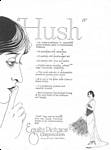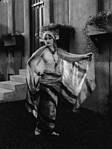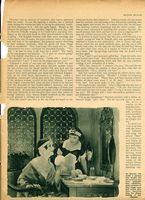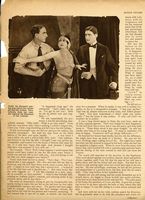

Hush (1921) Equity Pictures. Distributor: Jans Film Service. Director: Harry Garson. Story: Sada Cowan. Camera: Arthur Edeson. Cast: Clara Kimball Young, J. Frank Glendon, Kathlyn Williams, Jack Pratt, Bertram Grassby, Gerard Alexander, Beatrice Le Plante, John Underhill. 6 reels. This film is apparently LOST
| A poster for Hush (Thanks to David Menefee) |
 |
 |
This costume can be seen in the following fictionalization. |
 |
 |
 |
 |
Hush Money Should Be Plentiful
Somebody has called Clara Kimball Young the Lillian Russell of the screen. If he meant by this association of personalities that Miss Young grows younger, her architecture more svelte and her eyes brighter, I am willing to call the comparison correct. In fact he could have gone father because in her newest picture, "Hush," Miss Young carries with her a sprightliness and verve that become her as well as her invariable poise, and her beauty is even more brilliant than before. Equity Pictures can be congratulated in having as its newest offering one of the greatest pictures in which Clara Kimball Young has appeared.
The story is modern, in a high social atmosphere, and its figures move in settings of beauty and gorgeousness. Apparently money was plentifully and wisely expended. The picture emanates in an atmosphere of size and, too, that quality which is best described by that much abused word "class."
A most competent cast assists in the unfolding of a domestic drama of distress toward a climax which satisfies a legitimate public demand for happy endings. Clothed richly, acted well, titled with intelligence and wit, "Hush" provides an admirable vehicle for Miss Young. It is one of the satisfying big productions of the season.
"HUSH"
Harry Garson Production, Starring Clara Kimball Young Contains a Word of Warning to Woman.
Reviewed by Edward Weitzel.
"Hush" is a problem play. Its problem concerns the woman who has slipped from the path of virtue before marriage and is confronted with the consequences of telling her husband all about the affair or of locking the secret in her breast. As the problem is worked out in this instance it contains a word of warning to women. Sada Cowan, the author of the story, has her heroine confess, and pay dearly for her honesty. The husband of the heroine turns out to be a cad and shows his resentment in a series of petty acts toward his wife and the man he mistakes for her tempter that rob him of the respect of the spectator. Matters are brought to a satisfactory climax, but not until an unlovely exhibition of human weakness as been paraded before the eyes of the onlooker. Comedy relief is obtained by showing how foolish a woman can act with a new husband, when she is fat, fond and forty. The word of warning sounded by the author to members of her own sex is clearly indicated in the title.
Clara Kimball Young gives a very human characterization of the wife who is more truthful than discreet, and J. Frank Glendon is faithful to the author's conception of the man she marries. Kathlyn Williams, Jack Pratt and Bertram Grassby give able performances, and Gerard Alexander is capital as the comedy relief wife. The production maintains an excellent standard.
Cast:
| Vera Stanford | Clara Kimball Young |
| Jack Stanford | J. Frank Glendon |
| Isabel Dane | Kathlyn Williams |
| Hugh Graham | Jack Pratt |
| Herbert Brooks | Bertram Grassby |
| Grace Brooks | Gerard Alexander |
| Maid | Beatrice La Plante |
| Butler | John Underhill |
The Story: Vera Stanford is married to the man she truly loves but she is unhappy. She thinks of a brief moment of passion when she wandered into the garden at a masquerade with Herbert Brooks and permitted herself to be overcome by the music, the night and the embraces of the man who was with her. Vera has a friend, Isabel Dane, and both women are intimately acquainted with an artist, Hugh Graham. Brooks, the man Vera now loathes, has married a wealthy woman in Vera's set, and they all meet at Bar Harbor. The sight of Brooks acts on Vera's conscience so strongly that she confesses her misdeed to her husband, but will not tell him the name of the man. Stanford makes the mistake of thinking that the artist is the guilty unknown. Here are complications and misunderstandings aplenty until the truth comes out and husband wife wipe the slate clean and start afresh.
Program and Exploitation Catchlines: A Word of Warning to Women is Contained in "Hush," in Which Clara Kimball Young Is the Star.
Should a Wife Reveal Her One Fall from Virtue to Her Husband Is the Theme of "Hush," Starring Clara Kimball Young.
Exploitation Angles: Make a campaign on the title and boom the star. New York fell for a "Hush Week" when all unnecessary noises were to be cut out. You should be able to work it. Later get down to the big question of whether it is ever wise for a wife to tell her husband all her past. You can spread on this and get a newspaper essay contest.
Hush
(Clara Kimball Young--Equity--6,000 feet)
M.P.W.--"Hush" is a problem play. Matters are brought to a satisfactory climax, but not until an unlovely exhibition of human weakness has been paraded before the eyes of the onlooker.
N.--Interesting picture on a familiar theme.
E.H.--An elegantly produced picture with a domestic entanglement theme.
T.R.--A splendid story is well taken care of by a thoroughly capable cast of players.
W.--Star brightest spot in unconvincing story.
November 12, 1921
HUSH. Here is a picture that will please the better class. Beautiful gowns are worn and the acting is superb. You can advance your admission, I didn't, however. Advertising: photos, mail, posters. Patronage: high-class. Attendance: fair. W.E. Elkin, Temple Theatre, Aberdeen, Miss.
December 3, 1921
HUSH.A worn out star in a worn out story, no wonder Clara had to make personal appearance to put it over, however she failed to give me a personal appearance, so I lost some money on her picture. Advertising: regular. Patronage: mixed. Attendance: very poor. Steve Farrar, Orpheum Theatre, Harrisburg, Illinois.
The plan of certain persons always interested in the public, and publicity, was for Mayor Hylan to declare this "Hush Week" during which citizens would refrain from unnecessary noises and loose talking--and the woman, signing herself "C.K. Young," who wrote to the newspapers that she intended to commit suicide because she had lost the love of her husband by babbling to him about an indiscretion of her past, doubtless expected the papers to front-page her warning to all wives to "hush" when tempted to talk too much--but Mayor Hylan lost his enthusiasm for "Hush Week," and the suicide letter was crowded out of the newspapers--so the motion picture called "Hush," with Clara Kimball Young in the leading role, came into the Capitol yesterday much less conspicuously than it might have. And it is likely to remain for the week without becoming a Broadway sensation, for, although it seems now and then on the verge of becoming a shrewdly cynical photoplay, it never has the courage of its convictions and remains, for the most part, merely a conventional story of unconvincing love, estrangement and reconciliation. Its plot is told in "C.K. Young's" letter except for the threat of suicide. The motion picture wife who talks too little, rather than too much, by telling the man she had married part but not all of her experience, goes back to her husband as he decides to go out and look for her. Each forgives the other, and they are as happy as a movie couple can be.
One curious thing about the photoplay is that it puts all the blame on the husband. It rebukes him because he cannot feel comfortable in daily association with the man he thinks was the partner of his wife's adventure, and because he objects to his wife's appearing in public as a barely beaded Salome. He may be narrow-minded, but just how much broad-mindedness should a husband have?
The acting of Miss Young, while adequate in some scenes, is nothing exceptional at any time, and the others in the cast do nothing to break away from the artificiality of the plot. The production, which was directed by Harry Garson, has little cinematographic quality and its plentiful subtitles seem to have been written in uninspired imitation of "The Maxims of Methuselah," or whatever that book of trite and affected wisdom was called.
The Capitol program also includes two Pathe color picture, "Children of the Sun" and "An Afternoon with Nanki San," both interesting and pleasing to the eye.
Clara Kimball Young has a gorgeously costumed social drama in Hush, the best of her two August releases. The plot, which is of the sentimental problem variety, proves that it must be a terible thing to have a wife who has something to confess. The "something" in question took place long before she met her husband, but she persists in her too conscientious idea of unburdening herself concerning it. When she turns an adoring husband into a jealous and suspicious specimen, it causes her much tribulation and gives Clara Kimball Young opportunities for dramatic acting and a display of wonderful gowns, many of which are of her own designing. Frank Glendon is properly agitated as the jealous husband, and Kathlyn Williams, Bertram Grassby, and Beatrice La Plante make up a a strong supporting cast. The other film, Marrying Money is a slight comedy about the mutual discomfiture of a pair of fortune-hunters.
Last revised March 19, 2011